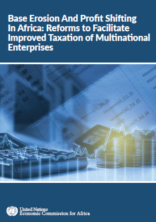Base Erosion And Profit Shifting In Africa: Reforms to Facilitate Improved Taxation of Multinational Enterprises

Increased domestic resource mobilization is central to achieving structural transformation in Africa which is in turn essential to addressing social and economic challenges on the continent, such as poverty, inequality and unemployment. . Most African countries, however, face major challenges in mobilising domestic resources for development. Most of these challenges are a direct result of poor governance, insufficient public investment, corruption and deflationary and externally imposed monetary and fiscal policies that promote systems that have failed to transform African countries. There are also challenges regarding underdeveloped tax laws, the low enforcement of tax laws and general administrative weakness.
Although there is a paucity of research on the linkages and transmissions of illicit financial flows from Africa, there has been much discussion about the meaning of such flows. The present report takes the position that addressing base erosion and profit shifting should be considered as part of the broad agenda to curtail illicit financial flows. Owing to the lack of data and transparency in reporting by multinational enterprises, the exact scale of corporate tax avoidance in Africa remains difficult to establish. Nevertheless, studies have shown that base erosion and profit shifting practices in Africa are prevalent. This entails having multinational enterprises exploit unsynchronized tax rules that have not kept pace with modern business models to erode countries’ tax bases and shift profits to low-tax jurisdictions. The result is reduced government tax revenue and a critical underfunding of public investment and infrastructure that could help to promote economic growth. Given that African countries rely heavily on corporate income tax, in particular from multinational enterprises, curtailing base erosion and profit shifting practices has the potential to increase taxes paid by these enterprises, enhancing domestic resource mobilization.